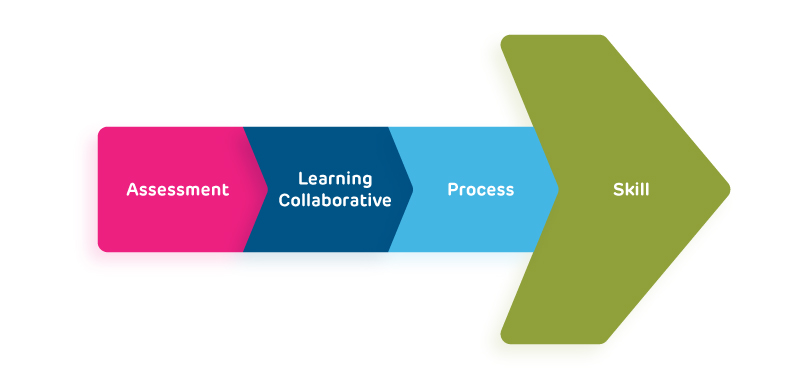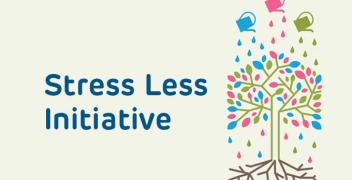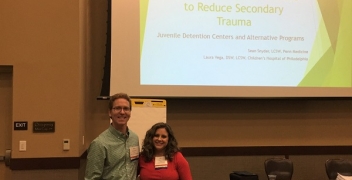Stress-Less Initiative©
Recognizing the Impact of Work that Helps Others
Helping professionals, or those who work in service of others, work in diverse settings from health care to social services to education. These professionals enjoy the intrinsic rewards of helping others, but they often bear witness to pain, suffering, and injustice while doing their work. These repeated exposures to the traumatic experiences of others can lead to secondary traumatic stress.
What is secondary traumatic stress? According to the National Child Traumatic Stress Network, secondary traumatic stress is defined as the “emotional duress that a person experiences when they hear about the firsthand traumatic experiences of another person.” Symptoms can mimic those of posttraumatic stress disorder and include re-experiencing (flashbacks, nightmares, or intrusive thoughts), avoidance, hyper-arousal, and changes in mood. Having trouble sleeping, feeling disconnected from friends and family, and avoiding difficult thoughts and feelings about patients are commonly reported. Secondary traumatic stress increases the risk for negative psychosocial and health outcomes for professionals, negatively impacts patient/client safety and wellbeing, and strains an organization.
The Stress-Less Initiative©: A Solution for an Unfilled Need
The Stress-Less Initiative© (SLI) is a trauma-informed group model to address and proactively buffer against secondary traumatic stress. SLI was developed by Dr. Laura Vega, the Co-Director of the Community Violence and Trauma Support Programs at CHOP’s Center for Violence Prevention and a clinical social worker. Dr. Vega recognized that secondary traumatic stress was a systematic issue, not an individual deficit, and identified an unmet need for organizationally based strategies to support helping professionals. She created SLI, a strengths-based model that supports professionals in increasing their awareness of secondary traumatic stress symptoms, understanding how to cope effectively, and receiving validation and encouragement from colleagues. SLI was first implemented to staff in CHOP’s Violence Intervention Program in 2015 and since has been implemented in other community settings (e.g., schools, community mental health settings).
The Design of the Stress-Less Initiative©
SLI is a 12-session evidence-informed intervention for teams. Colleagues gather in monthly 90-minute group sessions to capitalize on the power of shared experiences and support within a team. Because anyone can experience secondary traumatic stress, not just professionals on the frontlines, SLI encourages participation from team members from all helping roles and disciplines, including clinicians, managers, and administrators. Sessions are ideally facilitated by a supervisor or other team leader, which provides leadership an opportunity to empathize with staff experiences and identify additional possibilities for organizational changes to reduce staff stress and burnout.
Overview of an SLI Session
During each session, participants engage in four activities targeted to build strength and resilience:
- Assessment of individual stress levels and response to stressors
- Learning collaborative that includes strategies for approaching trauma-focused work to enhance protective capacity
- Group processing to reflect on challenges and benefits of trauma-focused work and provide validation and encouragement to peers
- Practice of a new coping or resilience-building skill introduced by a group member to build individual toolboxes of mind and body self-care strategies
SLI supports a safe and resilient organizational culture by investing in the health and wellness of staff so they can provide the best care to those they serve.
Interested in implementing Stress-Less with your own team? Email stressless@chop.edu.
Recommended Resources
- Completed Research Studies
Study team: Hillary M. Kapa, MPH, Laura Vega, DSW, LCSW, Paige K. Lombard, MPH, Michelle L. Jackson, MBA, MS, MEd, Sheena Miles, MS, MEd Joel A. Fein, MD, MPH, Rachel K. Myers, PhD, MS
CVP researchers partnered with the Netter Center for Community Partnerships and staff at two under-resourced K-8 schools in West Philadelphia to pilot a 12-session Stress-Less Initiative (SLI) intervention. As published in Psychology in the Schools, their subsequent qualitative study found that school-based staff perceived SLI was timely, meaningful, and highly relevant to their professional and personal lives. Staff also reported that SLI positively supported their well-being, team cohesion, and school culture.
Read a CHOP News Brief about this study.
Study team: Hillary M. Kapa, MPH, Elena Daniel, BA, Caitlin Axtmayer, LSW, MPH, Rachel K. Myers, PhD, MS, Laura Vega, DSW, LCSW
This study piloted the Stress-Less Initiative (SLI) intervention within a team of hospital-based healthcare professionals. After completing SLI, participants perceived greater personal attunement to their stress level and efficacy to self-advocate as well as enhanced team cohesion. Results, published in Traumatology, provide preliminary evidence of the practicality and value of implementing a strategic, team-based initiative within healthcare settings to support professionals’ individual and team wellbeing.
- SLI Brochure
Click here to learn more about the Stress-Less Initiative©.
- Secondary Traumatic Stress Webinar
Watch a webinar hosted by the Center for Violence prevention that provides actionable information for health care providers, psychologists, social workers, and other patient service providers so they can:
- Identify symptoms of secondary traumatic stress
- Encourage proactive organizational support
- Identify effective approaches for themselves and their colleagues to reduce stress associated with providing patient care.
- Take Care PHL's Secondary Traumatic Stress Website
CHOP’s Center for Violence Prevention staff members have collaborated with the Philadelphia ACE Task Force’s secondary traumatic stress (STS) committee to create the new Take Care PHL website. This website is home to resources that raise awareness, destigmatize STS, and enhance workplace practices to support employees.
Visit TakeCarePHL.org to:
- Learn more about STS and the ways in which it can impact caregivers
- Explore Solutions and search the Database to identify practical strategies for individuals, workplaces, and policy-makers to reduce STS
- Visit the Events page to sign up for virtual and in-person events focused on awareness, resilience, and workplace practices
- Find tailored resources to acknowledge and address STS among different provider groups, starting with substance use disorder providers, on the Provider Focus page







